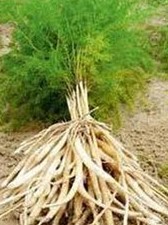SHATAVARI
(Asparagus Racemosus)
Dr Sangeeta Pahuja
Shatavari is scientifically known as Asparagus racemosus, is considered as the most important herb for women in Ayurveda. It has been used for centuries in Ayurvedic medicines and is considered as a general health tonic to rejuvenate body and mind.
Shatavari balances Vata, Pitta. In Ayurveda Shatavari is called-
|
Deepan (enhances stomach fire) |
Dahhara (relieve burning sensation) |
Sanghrahni(treats diarrhea) |
|
Pachan(digestive) |
Trutahara (relieve thirst) |
Krimihara (wormicidal) |
|
Rochan (increase appetite) |
Mehahara (treats urinary tract disorders) |
Arsha(helpful in the treatment of piles) |
|
Anuloman (improve breathing) |
Rasayana (immune-modulator) |
Krichra (relieve painful micturition)
|
|
Vamanopaga (antiemetic) |
Balya (improve muscle strength) |
Shonitsthapan (haemostatic) |
|
Vatasthapana (anti-ageing ) |
Kanthya (relieve sore throat) |
Aamhara (treats indigestion) |
|
Jwarhara (antipyretic) |
Hridya (cardio protective) |
Garbhaprada (increase fertility) |
|
Kasahara (Relieves cough) |
Chaksushya (improve eve sight) |
Shwasa (relieve breathing difficulty) |
 Shatavari has beneficial impact on female reproductive system. It has been used in Ayurveda to strengthen female fertility and can also be used in pregnancy to nourish both the mother and fetus. Shatavari can be used for all stages of women reproductive cycle; from menarche to menopause.
Shatavari has beneficial impact on female reproductive system. It has been used in Ayurveda to strengthen female fertility and can also be used in pregnancy to nourish both the mother and fetus. Shatavari can be used for all stages of women reproductive cycle; from menarche to menopause.
It is very helpful during pre-menopausal period as it contains phytoestrogens, which are precursor to oestrogen. Phytoestrogens may reduce the hot flashes, stabilize the mood swings and maintain normal bone density and prevent osteoporosis. Due to the abundance of phytoestrogen, it can be helpful to restore the hormone levels in case of hysterectomy.
It's an excellent herb for women as well as for men also as it increases the semen production.
Shatavari plays an important role in strengthening the immune system as it has Antioxidant properties and antioxidants helps to prevent free radical cell damage.
Different chemicals present in shatavari like steroidal Saponins known as shatavarins, alkaloids, oligosaccharides, mucilage, isoflavons, flavonoids, sterols such as quercetin, sitosterol are present in shatavari roots reduce the oxidative stress.
There are various minerals present in the shatavari roots like copper manganese, zinc and cobalt. It also contains calcium, magnesium, selenium and potassium. It also contains vitamins such as Vitamin A and ascorbic acid.
Shatavari contains essential fatty acids like gama linolenic acid, which is beneficial for the treatment of arthritis, diabetes mellitus, heart disease. Regular consumption of shatavari in lactating mothers increases milk production.
By consuming the shatavari, the chances of conception become high and also the gastric problems can be cured.
It has been used as Diuretic also in herbal preparations. According to researchers, Shatavari roots extract prevent the formation of oxalate stones. It increases the magnesium concentration in the urine and is helpful in treatment of kidney stones.
Shatavari is available in powder, tablet and liquid forms. Dosage of tablet is 500mg twice daily. Dosage of shatavari extract is 30 drops in water or juice thrice a day.
Always consult your doctor for therapeutic purpose for better results.
Follow Ayurveda and stay healthy.
—00—
< Contents